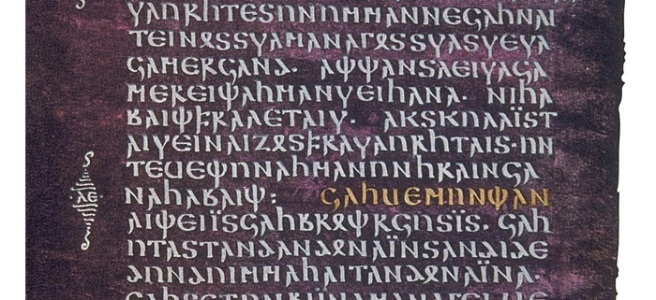New thing, what.
Since Hveitstad is a historically Folian city (and to this day there are many ethnic Fols living in it), then at the excavations near it anyone would hope to find, first of all, something Folian. Well, yes, less than two years have passed - we finally found it.
In the next batch of documents there are notes written by the younger fufark in Old Ruginian. Probably our old friend Lodinn, but that’s how it is. The real salt is in the content of these inscriptions:
…ᛁ ᚼᚢᛁᛏᛅᛋᛏᛅᚦ ᚢᛅᛦ ᛁᚴ ᚦᛅᚱ ᚦᚢᛦ ᚦᛁᚢᚦ ᛁᛦ ᛚᛁᚴᛁᛋᚴ ᚢᛋ. ᛁᚾ ᛁᚱᚠᛁᛏ ᛁᛋ ᛅᛏ ᚴᚢᚾᛅ ᚦᛅᚢ ᚦᚢ ᛅᛏ ᚢᛅᚱᛏ ᚢᚴ ᚦᛆᛁᛦᛅ ᛘᛅᛚ ᛁᛦᚢ ᚴᛚᛁᚴ…
…í hvítastað vaʀ ek, þar býʀ þjóð, eʀ líkisk os(s). en erfit(t) es at kun(n)a þau, þó at várt ok þeiʀ(ʀ)a mál eʀu glík…
“...I was in Hveitstad, people similar to us live there. But it’s hard to understand them, even though ours and their languages are similar...”
Then he describes a little the customs of the locals, and also mentions their self-name:
…heitask full(l)ans, á os(s)u máli ful(l)u…
“...They are called fols, in our language they are fuls...”
This, by the way, is a very characteristic moment. The self-name of fouls is traced back to the Proto-Germanic *fullaz “full”, and the Old Ruginian word fullu This is precisely what “full” means. That is, either Lodinn himself made an analogy and used the native analogue of the word, or this ethnonym was already known in his area. I'm betting on the former.
And he also mentions that the local people have already accepted Christianity, but not quite yet, and in confirmation of this he cites a whole list of gods in which the fouls still continue to believe. Comparing with your own, of course. There are a whole bunch of them out there, so here are just a few examples:
- Óðinn (One) - 𐍅𐍉𐌳𐌰𐌽𐍃, Yodanс (Vodance)
- Þórr (Thor) - 𐌸𐌿𐌽𐍂𐍃, Ѱnnʀs (Tunrs)
- Freyja (Freya) - 𐍆𐍂𐌰𐌿𐌾𐍉, Fʀango (Fraujo)
... (thousands of them!)

